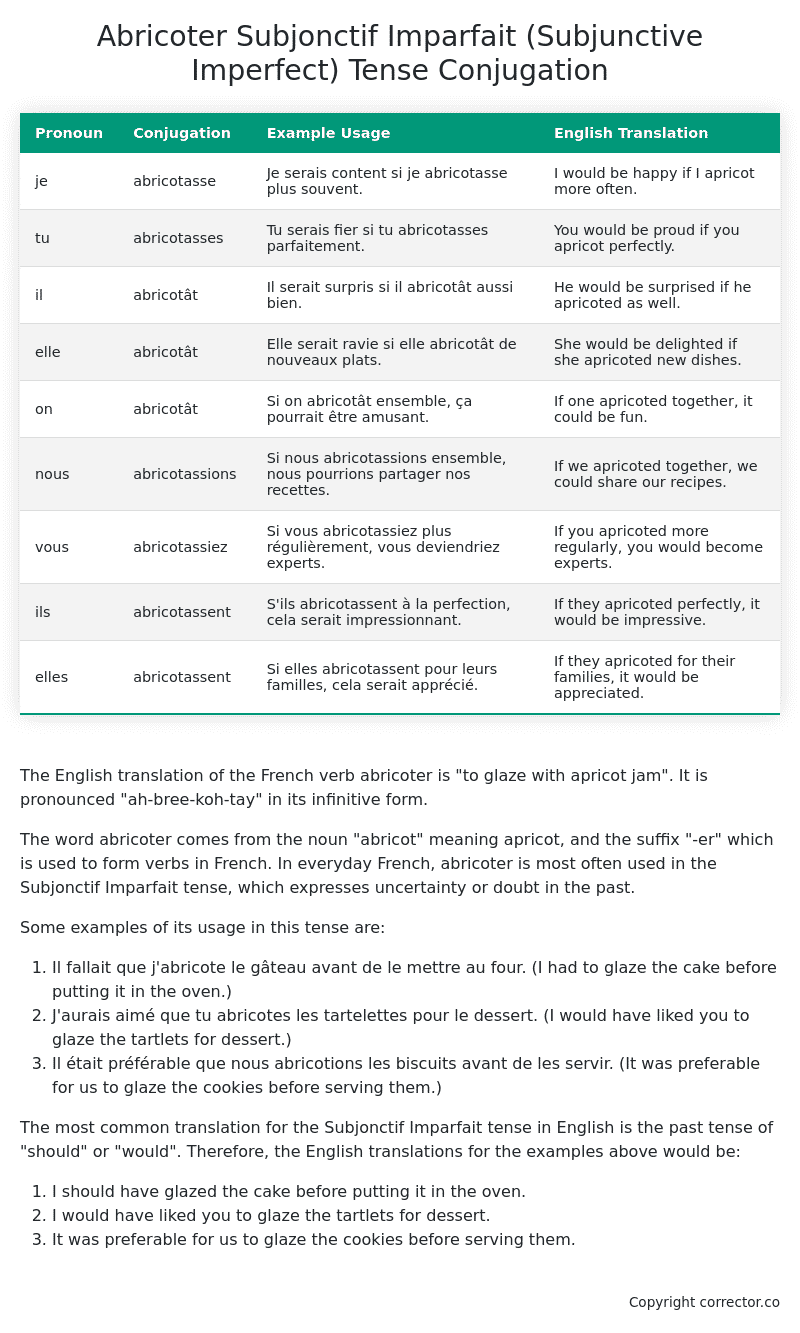Subjonctif Imparfait (Subjunctive Imperfect) Tense Conjugation of the French Verb abricoter
Introduction to the verb abricoter
The English translation of the French verb abricoter is “to glaze with apricot jam”. It is pronounced “ah-bree-koh-tay” in its infinitive form.
The word abricoter comes from the noun “abricot” meaning apricot, and the suffix “-er” which is used to form verbs in French. In everyday French, abricoter is most often used in the Subjonctif Imparfait tense, which expresses uncertainty or doubt in the past.
Some examples of its usage in this tense are:
- Il fallait que j’abricote le gâteau avant de le mettre au four. (I had to glaze the cake before putting it in the oven.)
- J’aurais aimé que tu abricotes les tartelettes pour le dessert. (I would have liked you to glaze the tartlets for dessert.)
- Il était préférable que nous abricotions les biscuits avant de les servir. (It was preferable for us to glaze the cookies before serving them.)
The most common translation for the Subjonctif Imparfait tense in English is the past tense of “should” or “would”. Therefore, the English translations for the examples above would be:
- I should have glazed the cake before putting it in the oven.
- I would have liked you to glaze the tartlets for dessert.
- It was preferable for us to glaze the cookies before serving them.
Table of the Subjonctif Imparfait (Subjunctive Imperfect) Tense Conjugation of abricoter
| Pronoun | Conjugation | Example Usage | English Translation |
|---|---|---|---|
| je | abricotasse | Je serais content si je abricotasse plus souvent. | I would be happy if I apricot more often. |
| tu | abricotasses | Tu serais fier si tu abricotasses parfaitement. | You would be proud if you apricot perfectly. |
| il | abricotât | Il serait surpris si il abricotât aussi bien. | He would be surprised if he apricoted as well. |
| elle | abricotât | Elle serait ravie si elle abricotât de nouveaux plats. | She would be delighted if she apricoted new dishes. |
| on | abricotât | Si on abricotât ensemble, ça pourrait être amusant. | If one apricoted together, it could be fun. |
| nous | abricotassions | Si nous abricotassions ensemble, nous pourrions partager nos recettes. | If we apricoted together, we could share our recipes. |
| vous | abricotassiez | Si vous abricotassiez plus régulièrement, vous deviendriez experts. | If you apricoted more regularly, you would become experts. |
| ils | abricotassent | S’ils abricotassent à la perfection, cela serait impressionnant. | If they apricoted perfectly, it would be impressive. |
| elles | abricotassent | Si elles abricotassent pour leurs familles, cela serait apprécié. | If they apricoted for their families, it would be appreciated. |
Other Conjugations for Abricoter.
Le Present (Present Tense) Conjugation of the French Verb abricoter
Imparfait (Imperfect) Tense Conjugation of the French Verb abricoter
Passé Simple (Simple Past) Tense Conjugation of the French Verb abricoter
Passé Composé (Present Perfect) Tense Conjugation of the French Verb abricoter
Futur Simple (Simple Future) Tense Conjugation of the French Verb abricoter
Futur Proche (Near Future) Tense Conjugation of the French Verb abricoter
Plus-que-parfait (Pluperfect) Tense Conjugation of the French Verb abricoter
Passé Antérieur (Past Anterior) Tense Conjugation of the French Verb abricoter
Futur Antérieur (Future Anterior) Tense Conjugation of the French Verb abricoter
Subjonctif Présent (Subjunctive Present) Tense Conjugation of the French Verb abricoter
Subjonctif Passé (Subjunctive Past) Tense Conjugation of the French Verb abricoter
Subjonctif Imparfait (Subjunctive Imperfect) Tense Conjugation of the French Verb abricoter (this article)
Subjonctif Plus-que-parfait (Subjunctive Pluperfect) Tense Conjugation of the French Verb abricoter
Conditionnel Présent (Conditional Present) Tense Conjugation of the French Verb abricoter
Conditionnel Passé (Conditional Past) Tense Conjugation of the French Verb abricoter
L’impératif Présent (Imperative Present) Tense Conjugation of the French Verb abricoter
L’infinitif Présent (Infinitive Present) Tense Conjugation of the French Verb abricoter
Struggling with French verbs or the language in general? Why not use our free French Grammar Checker – no registration required!
Get a FREE Download Study Sheet of this Conjugation 🔥
Simply right click the image below, click “save image” and get your free reference for the abricoter Subjonctif Imparfait tense conjugation!

Abricoter – About the French Subjonctif Imparfait (Subjunctive Imperfect) Tense
Formation
Common Everyday Usage Patterns
Interactions with Other Tenses
Subjonctif Présent
Indicatif Passé Composé
Conditional
Conditional Perfect
Summary
I hope you enjoyed this article on the verb abricoter. Still in a learning mood? Check out another TOTALLY random French verb conjugation!


